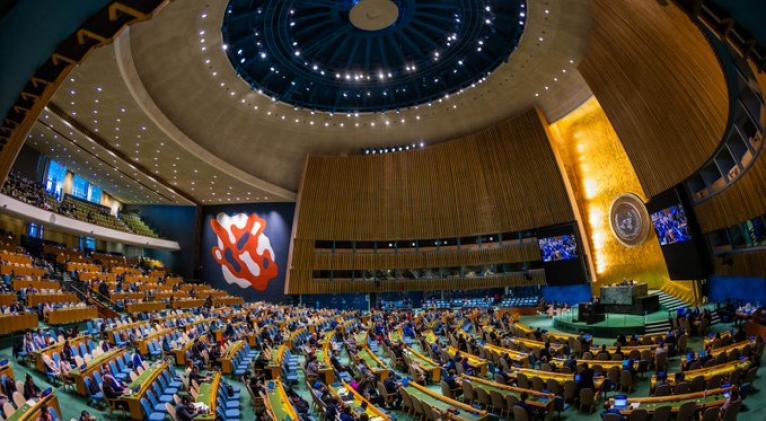Dismantling Fake News: “It’s Not a Blockade, it’s an Embargo”
especiales

Among the fake news circulating in the media and on the networks, a very common one is often found: “It’s not a blockade, it’s an embargo. Cuba can trade with the 187 countries that voted against the blockade.” Faced with this false statement, the first thing to ask is: Why then did countries with right-wing governments (even far-right ones like Italy, for example) vote against the blockade?
The #BloqueoGenocida against Cuba, which began in the 1960s, has a significant extraterritorial impact due to the legislation that allows for the sanctioning of companies and third countries that have commercial relations with #Cuba.
This goes beyond a simple bilateral embargo between the US and Cuba, extending to other nations and economic sectors through the application of laws such as the Helms-Burton Act (1996) and the Torricelli Act (1992).
1. The Torricelli Act, also known as the “Cuban Democracy Act of 1992,” prohibited subsidiaries of US companies abroad from doing business with Cuba. This means that even if a US company has a branch in a third country, it cannot trade with Cuba without facing sanctions in the US. This affected sectors such as the pharmaceutical sector, since companies outside the US, with any ties to US companies, cannot sell medicines or medical technology to Cuba.
2. The Helms-Burton Act of 1996 intensified restrictions by allowing US citizens to sue in US courts foreign companies that “traffic” in properties in Cuba that were expropriated after the #CubanRevolution. This includes, for example, land, real estate or companies that may have been nationalized at the time. As a result, many foreign companies avoid investing in Cuba so as not to expose themselves to lawsuits in the US, limiting Cuba's ability to attract foreign direct investment.
The activation of Title III of this law in 2019 deepened the blockade, as it allows foreign companies that use properties or assets that were once owned by US citizens before being nationalized to be sued in US courts.
3. Added to this are the sanctions that also impact global financial systems, as international banks avoid handling transactions involving Cuba to avoid retaliation. US regulations prohibit banks in other countries from doing business with Cuba if they want to continue accessing the US financial system.
In 2014, for example, the French bank BNP Paribas was fined almost $9 billion for violating this unilateral US policy against Cuba and other sanctioned countries. These types of penalties have caused many European and Latin American banks to not want to process transfers to or from Cuba.
4. In addition to financial products, the blockade affects supply chains and access to technology. Manufacturers in third countries must ensure that their products do not contain US components if they plan to sell them to Cuba, since any US content could make the product subject to sanctions.
This complicates the import of medical equipment, vehicle parts, computer technology and other products critical to the Cuban economy and services. In sectors such as agriculture or energy, for example, Cuba faces great difficulties in acquiring spare parts and machinery due to these restrictions, which affects its productive capacity.
The restrictions also affect shipping and transport companies, prohibiting ships transporting to Cuba from entering US ports for six months. This limits the capacity of the Cuban economy to import goods and increases the cost of importing goods, as many international transport companies avoid trading with Cuba so as not to risk losing access to US ports.
Therefore, this blockade is more than that, it’s a brutal economic, financial and commercial war without precedent.
It expands the influence of the US over the Cuban economy and limits its commercial and financial relations with the rest of the world. The restrictions make it difficult for foreign investment to enter Cuba, the acquisition of advanced technologies, access to global financial markets and the import of essential goods.
In general, these measures seek to economically suffocate Cuba by preventing it from accessing resources and international exchanges that could improve the quality of life of its population and the development of its economy.
6. #OFFthelist The inclusion of Cuba in the spurious list of "countries sponsoring terrorism" by the US significantly aggravates the difficulties for foreign companies that wish to operate on the island. This designation implies the application of additional sanctions and financial restrictions, reinforces the extraterritorial impact of the blockade and adds obstacles that further complicate trade and financial relations with Cuba.
These include financial and banking restrictions, facing even more barriers to accessing the global financial system; increased transaction and logistics costs, as foreign companies trading with Cuba face higher costs due to the need to use intermediary banks in countries not under US influence, which makes trade and investment operations more expensive and discourages the participation of foreign companies in the Cuban economy; the distrust of investors who fear legal consequences or the loss of access to the US market, which mainly affects strategic sectors such as tourism, where Spanish companies actively participate; additional prohibitions on the export of technology and goods, especially those with US components, such as software systems or advanced technology; and the prejudice to trade relations with other countries, as some countries avoid trading with Cuba to avoid diplomatic conflicts or secondary sanctions. Although the European Union maintains a position of rejection of the blockade and supports commercial relations with Cuba, some European banks and companies limit their transactions in order not to run additional risks, which also affects foreign companies that try to operate in Cuba.
In short, the US BLOCKADE against Cuba qualifies as a crime of genocide, but it also attacks the interests of third countries (and hence its vote).
It’s a bloody and systematic violation of human rights. It’s the most flagrant, comprehensive, integral and prolonged unilateral coercive system ever applied to a people.
Translated by Amilkal Labañino / CubaSí Translation Staff














Add new comment